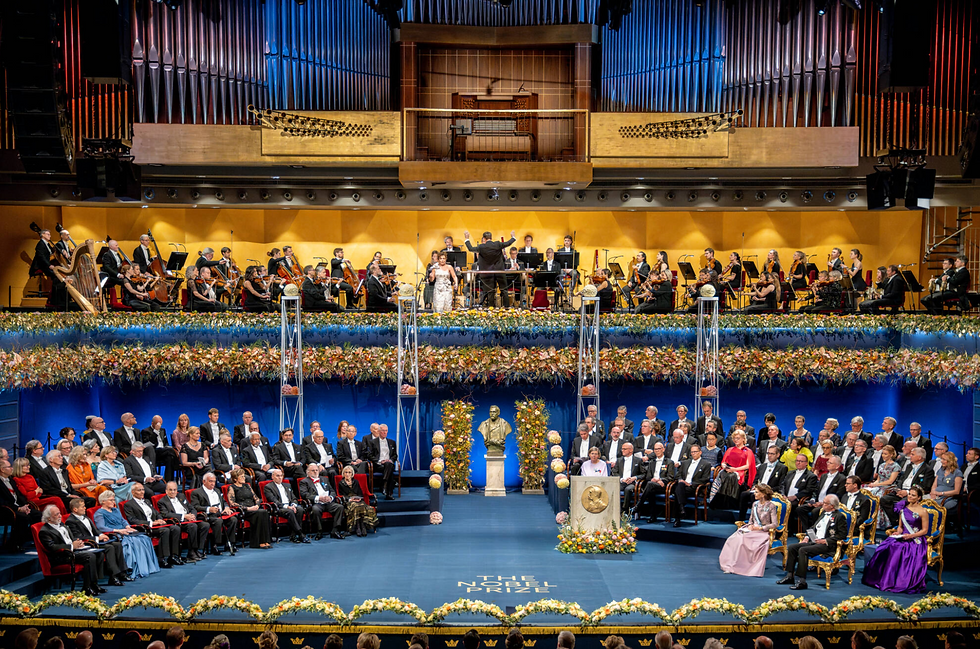Nobel Prizes championing sustainable development goals
- Editorial Team SDG17

- Jul 21, 2025
- 4 min read

The Sustainable Development Goals (SDGs), adopted by the United Nations in 2015, provide a universal blueprint for addressing pressing global challenges such as poverty, hunger, health, and climate change. The Nobel Prizes, awarded annually for outstanding contributions to humanity, have often recognised individuals and organisations whose work aligns with these goals. By honouring achievements in peace, science, and economics, the Nobel Prizes amplify efforts to build a sustainable, equitable global society. Addressing these interconnected challenges is critical to fostering resilience, promoting equality, and ensuring a thriving planet for future generations.
Aligning Nobel achievements with SDGs
The Nobel Prizes have consistently highlighted breakthroughs and initiatives that resonate with the SDGs. Since the inception of the SDGs, numerous laureates have been recognised for contributions that directly or indirectly support these global objectives. According to the United Nations, approximately 700 million people still live in extreme poverty (SDG 1), while 828 million face hunger daily (SDG 2). These statistics underscore the urgency of continued efforts, many of which are exemplified by Nobel laureates.
In 2006, Muhammad Yunus and the Grameen Bank received the Nobel Peace Prize for pioneering microcredit, a transformative financial model that has empowered millions in low-income communities to escape poverty. By 2020, microfinance institutions had reached over 140 million clients globally, with 80% being women, highlighting its alignment with SDG 5 (Gender Equality) as well. Similarly, the World Food Programme (WFP), awarded the 2020 Peace Prize, delivers food assistance to over 100 million people annually across 80 countries, directly addressing SDG 2 (Zero Hunger) while fostering peace in conflict zones.
Health advancements, central to SDG 3, have also been celebrated. In 2015, Tu Youyou won the Nobel Prize in Physiology or Medicine for her discovery of artemisinin, a malaria treatment credited with saving millions of lives, particularly in sub-Saharan Africa, where malaria cases reached 233 million in 2022. Likewise, the 2006 discovery of RNA interference by Craig Mello and Andrew Fire opened new avenues for disease treatment, with potential applications in combating cancer and viral infections.
Education and gender equality, SDGs 4 and 5, have been championed by laureates like Malala Yousafzai (2014 Peace Prize), whose advocacy for girls’ education has inspired global movements, and Nadia Murad (2018 Peace Prize), whose work against sexual violence as a weapon of war has advanced gender justice. In 2011, Ellen Johnson Sirleaf, Leymah Gbowee, and Tawakkol Karman were recognised for their non-violent contributions to women’s safety and peace-building, reinforcing the link between gender equality and societal stability. UNESCO reports that 129 million girls remain out of school globally, underscoring the ongoing relevance of these efforts.
While no Nobel Prize has been awarded specifically for SDG 6 (Clean Water and Sanitation), many laureates indirectly support this goal through humanitarian work. For instance, Yunus’s microfinance initiatives often fund water infrastructure in impoverished regions. Similarly, SDG 7 (Affordable and Clean Energy) is advanced by the 2019 Chemistry Prize awarded to John Goodenough, M. Stanley Whittingham, and Akira Yoshino for developing lithium-ion batteries, which power renewable energy systems. By 2023, global renewable energy capacity reached 3,870 gigawatts, partly enabled by such technological advancements.
Climate action (SDG 13) was spotlighted in 2007 when the Intergovernmental Panel on Climate Change (IPCC) and Al Gore received the Peace Prize for raising awareness about climate change. The IPCC’s reports have informed global policies, contributing to a 1.5% annual reduction in global CO2 emissions growth rates since 2010. Peace and justice (SDG 16) have been advanced by figures like Nelson Mandela (1993) and the Tunisian National Dialogue Quartet (2015), whose efforts in ending apartheid and building democracy demonstrate the power of inclusive governance. Finally, SDG 17 (Partnerships for the Goals) is embodied by organisations like the WFP and UNICEF, whose Nobel-recognised work thrives on global cooperation.
The impact of these Nobel laureates is evident in tangible outcomes. The Grameen Bank’s microcredit model has inspired initiatives like India’s Self-Help Groups, which by 2022 had empowered 120 million rural women with financial access. The WFP’s operations in Yemen, where 17 million people face food insecurity, exemplify how Nobel-recognised efforts address immediate crises while laying foundations for long-term stability. Tu Youyou’s malaria treatment has reduced global malaria deaths by 20% since 2000, according to the World Health Organization.
Looking forward, the integration of lithium-ion battery technology into renewable energy systems is projected to support a 50% increase in global clean energy adoption by 2030. Malala’s advocacy continues to drive initiatives like the UN’s Education Cannot Wait fund, which has supported 7 million children in crisis settings since 2016. However, challenges remain: 1.3 billion people lack access to clean energy, and 2.4 billion lack adequate sanitation, highlighting gaps where future Nobel-worthy innovations are needed.
The global society
Achieving the SDGs requires a collective effort from governments, organisations, and individuals. The Nobel Prizes underscore the importance of global collaboration, as seen in the IPCC’s multinational research efforts or the WFP’s partnerships with over 1,000 NGOs. These examples demonstrate that sustainable progress hinges on shared knowledge, resources, and commitment. The global society must continue to support such initiatives, fostering innovation and inclusivity to address interconnected challenges like poverty, hunger, and climate change.
The Nobel Prizes serve as a powerful reminder of humanity’s capacity to tackle global challenges through innovation, compassion, and collaboration. By recognising efforts aligned with the SDGs, they inspire continued action towards a sustainable future. As the world strives to meet the 2030 Agenda, these laureates’ legacies highlight the need for persistent effort and global unity. For more insights into global sustainability efforts, explore resources at the United Nations Sustainable Development Goals platform or the Nobel Prize website.
Youtube credits: https://www.youtube.com/@georgetownuniversity



